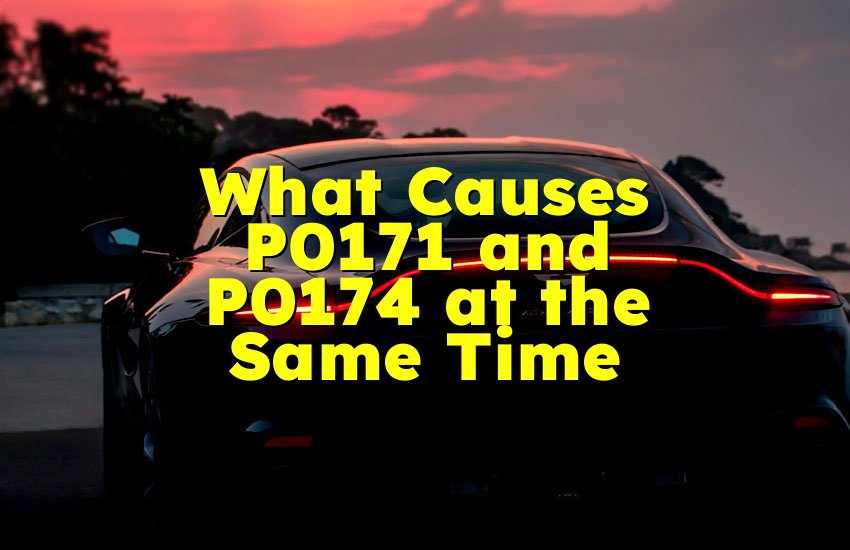As an Amazon Associate, I earn from qualifying purchases at no extra cost to you.
What Causes P0171 and P0174 at the Same Time: Expert Guide
If your car is showing both P0171 and P0174 codes, it usually means the engine is running too lean on both banks. This can feel confusing and worrying, but there is a solution. Most often, it is caused by vacuum leaks, dirty sensors, or fuel issues. In this article, we will explain the main reasons these codes appear together, show how to find the problem, and guide you to fix it in a simple way.
Vacuum Leaks and Their Effects on Engine Performance
One of the most common causes of P0171 and P0174 at the same time is a vacuum leak. Vacuum leaks happen when air enters the engine without going through the proper fuel mixture.
This extra air makes the engine run lean, which means there is too much air and not enough fuel. Drivers often notice rough idling, stalling, or even loss of power when a vacuum leak is present.
Leaks can occur in hoses, gaskets, or intake manifolds. Even small cracks in hoses can cause these codes. Over time, rubber parts dry out or crack, letting unmetered air enter.
Mechanics often use smoke machines to find leaks because air can escape from spots you cannot see. Regular inspection of hoses and connections can prevent this issue from worsening.
The Mass Air Flow (MAF) sensor is also sensitive to leaks. When air enters the system unexpectedly, the MAF sensor reads wrong values. This confuses the engine computer, which then triggers P0171 and P0174 codes. Fixing vacuum leaks is usually simple once the source is found. Replacing cracked hoses or sealing the intake manifold often solves the problem.
In addition, check the brake booster and PCV system. These are common spots for leaks. If the engine sucks in air through them, both banks can show lean conditions. Using simple tools like carb cleaner or smoke tests can help detect these leaks fast.
- Vacuum leaks cause too much air in the engine
- Hoses, gaskets, and intake cracks are usual spots
- MAF sensor reacts to extra air and triggers codes
- Brake booster and PCV system can also leak
Dirty or Faulty Mass Air Flow Sensor
Another major reason for P0171 and P0174 codes is a dirty or faulty Mass Air Flow sensor. The MAF sensor measures the air entering the engine and tells the computer how much fuel to inject.
If it is dirty, the readings are incorrect. This can make both banks run lean, especially at idle or light throttle. Drivers may notice hesitation, poor acceleration, or rough idling when the MAF sensor is bad.
Cleaning the MAF sensor is often enough to solve the problem. A special MAF cleaner spray can remove dirt and oil buildup without damaging the sensor.
Avoid touching the sensor wires because they are delicate. If cleaning does not help, the sensor may need replacement. A new sensor will restore correct air measurement and stop the lean codes.
It is also important to check for wiring issues. Sometimes the sensor works but the wiring has a short or loose connection. Inspect the harness and connectors carefully. Any damage can confuse the computer and cause the codes to return even with a new sensor.
Regular maintenance is key. Keeping the air filter clean prevents debris from reaching the sensor. A clean MAF sensor improves fuel economy, engine smoothness, and reduces lean code risks. Many drivers fix lean codes simply by cleaning or replacing the MAF sensor.
- MAF sensor measures air intake for correct fuel
- Dirt or oil can give wrong readings
- Cleaning or replacing the sensor solves codes
- Check wiring and keep air filter clean

Fuel Delivery Problems
Fuel delivery problems are another common cause of both P0171 and P0174. If the engine is not getting enough fuel, it will run lean. Low fuel pressure or a clogged fuel injector can create this condition. Drivers may feel hesitation, poor acceleration, or stalling when fuel delivery is poor. Fuel pumps, fuel filters, and injectors all need attention when lean codes appear.
A clogged fuel filter restricts the flow to the engine. Replacing the filter often fixes the lean condition. Similarly, weak fuel pumps may not provide enough pressure. Testing fuel pressure with a gauge can confirm if the pump is failing. Replacing a weak pump is usually straightforward.
Fuel injectors can also be dirty or stuck. Cleaning them can restore proper spray and fuel distribution. Sometimes, one injector leaks and causes lean conditions on one bank, but severe problems affect both banks. Fuel additives or professional cleaning can help. Regular maintenance of fuel system components prevents lean codes from returning.
Checking fuel lines for leaks is also essential. A leak before the engine can reduce pressure and cause lean codes. Using transition words like “also” and “similarly” helps understand how multiple factors combine to affect fuel delivery.
- Low fuel pressure causes lean codes
- Clogged fuel filters restrict fuel flow
- Dirty or faulty injectors worsen lean conditions
- Fuel lines and pump must be checked
Exhaust Leaks Affecting Oxygen Sensors
Exhaust leaks can also trigger P0171 and P0174 codes. Leaks allow extra oxygen into the exhaust system, confusing the oxygen sensors. The sensors then report a lean condition to the engine computer. Common spots for leaks include exhaust manifolds, gaskets, and downpipes. Even small cracks can cause both banks to show lean codes.
When oxygen sensors detect extra oxygen, the computer reduces fuel to compensate. This worsens the lean condition. Drivers may notice unusual exhaust sounds, decreased fuel efficiency, or slight roughness at idle. Addressing exhaust leaks quickly is important because running lean for long periods can damage the engine.
Inspect the exhaust manifold gasket and the connections near the catalytic converter. Exhaust leaks near sensors are the most likely to trigger codes. Mechanics sometimes use a smoke test or listen for hissing sounds to find leaks. Replacing gaskets or tightening bolts usually fixes the problem.
In addition, pay attention to rust and corrosion. Older vehicles are prone to rusted exhaust pipes, which can also create leaks. Even small rust holes can let air in and trigger lean codes. Regular inspection of the exhaust system can prevent future issues.
- Exhaust leaks let extra oxygen enter
- Sensors detect lean mixture on both banks
- Gaskets, manifolds, and pipes are common spots
- Rust and corrosion can create leaks
Faulty or Aging Oxygen Sensors
Aging or faulty oxygen sensors are another cause of P0171 and P0174. These sensors measure the oxygen in exhaust gases to adjust fuel. If the sensors fail, they may report lean conditions even if the engine is fine. Drivers may notice poor performance, check engine light, and reduced fuel economy. Both banks may show codes if multiple sensors are affected.
Replacing old oxygen sensors usually resolves the issue. Modern sensors last 60,000 to 100,000 miles, but exposure to heat and contamination can shorten their life. Testing the sensors with a multimeter or scan tool confirms their condition. Cleaning sensors is not recommended because it may damage them further.
It is also important to check the wiring and connectors. Heat and vibration can damage wires, causing incorrect readings. Properly seated connectors ensure sensors work correctly. When new sensors are installed, the computer often needs a reset to clear old codes.
Regular replacement of oxygen sensors as part of vehicle maintenance prevents lean code issues. This keeps fuel mixture balanced, improves performance, and reduces emissions. Many drivers notice smoother running engines and better gas mileage after replacing old sensors.
- Oxygen sensors adjust fuel based on exhaust
- Old or faulty sensors give false lean readings
- Replacing sensors fixes codes
- Check wiring and reset computer after replacement
Engine Control Module (ECM) Issues
Sometimes, the problem is the Engine Control Module (ECM) itself. The ECM uses sensor data to control fuel injection. If the module is failing or has software issues, it may incorrectly trigger P0171 and P0174 codes. Drivers may notice random codes, rough running, or even misfires. Diagnosing ECM problems requires careful testing.
Before blaming the ECM, check all sensors and wiring. ECM errors are rare but possible if everything else checks out. Updating the ECM software can fix glitches in some vehicles. In severe cases, replacing the module may be necessary. Always use a professional or dealership to handle ECM issues because programming and installation require skill.
It is important to note that ECM issues often appear alongside other problems. For example, a weak signal from a MAF or oxygen sensor may seem like a sensor problem but is actually the ECM misreading the data. Careful diagnosis ensures money is not wasted on parts that are still functional.
Maintaining electrical connections, avoiding water exposure, and keeping the battery healthy helps prevent ECM problems. When all else fails, a professional scan and test are the safest route. A properly functioning ECM keeps fuel mixture balanced and avoids lean codes.
- ECM controls fuel based on sensors
- Faulty ECM can trigger false lean codes
- Check sensors and wiring before replacing ECM
- Software updates or replacement may fix issues
Final Thoughts
P0171 and P0174 codes together usually mean the engine runs too lean on both banks. Most causes are vacuum leaks, dirty sensors, fuel problems, or exhaust leaks. By inspecting hoses, sensors, fuel system, and exhaust, you can find and fix the problem. Regular maintenance prevents these issues. Following this guide can save money, reduce stress, and keep your car running smooth.
| Cause | What to Check | Fix | Notes |
|---|---|---|---|
| Vacuum leaks | Hoses, gaskets, intake, PCV, brake booster | Replace or seal leaks | Use smoke test or carb cleaner |
| MAF sensor | Sensor and wiring | Clean or replace sensor | Keep air filter clean |
| Fuel delivery | Fuel pump, filter, injectors | Replace or clean components | Test fuel pressure |
| Exhaust leaks | Manifold, gaskets, pipes | Repair or replace | Listen for hissing, check rust |
| Oxygen sensors | Sensors and wiring | Replace sensors | Reset computer after replacement |
| ECM issues | ECM software and wiring | Update or replace ECM | Professional help recommended |
Frequently Asked Questions (FAQs)
Is it dangerous to drive with P0171 and P0174?
Yes, driving with these codes can be risky. Lean fuel mixtures may cause engine overheating, rough idling, or even misfires. Over time, it can damage the catalytic converter or pistons. It is better to fix the issue quickly. You can drive short distances if necessary, but avoid heavy load or long trips until repairs are done. Checking vacuum leaks and sensors first often solves the problem safely.
Can a dirty air filter cause P0171 and P0174?
Yes, a dirty air filter can contribute. It restricts airflow, which affects the MAF sensor readings. If the sensor gets wrong data, the ECM may reduce fuel incorrectly, triggering lean codes. Cleaning or replacing the air filter can restore airflow. Combined with MAF cleaning, this often fixes the problem. Regular air filter maintenance is key for smooth engine operation.
Do I need a professional to fix these codes?
Not always. Some causes like vacuum leaks, dirty sensors, or air filters can be fixed by car owners with basic tools. However, complex issues like ECM faults or hidden fuel problems may need a professional. Mechanics have scan tools and smoke machines for accurate diagnosis. Start with simple checks first, then consider professional help if codes persist.
Is it possible for both codes to appear from one issue?
Yes, a single issue can trigger both codes. For example, a vacuum leak before the intake manifold can affect both banks equally. A faulty MAF sensor may also report lean conditions across the engine. Diagnosing carefully is important. Checking sensors, hoses, and fuel delivery first helps identify the root cause efficiently.
Can fuel additives fix lean codes?
Fuel additives can help if injectors are slightly clogged. They clean deposits and improve fuel spray, which can fix minor lean conditions. However, they are not a permanent fix for major problems like vacuum leaks, faulty sensors, or ECM issues. Regular maintenance and proper diagnosis are necessary for a lasting solution.
Do I need to replace both oxygen sensors?
It depends. If both sensors are old, replacing them together ensures balanced readings. Sometimes only one sensor fails, but both banks may show codes due to sensor placement. Testing with a scan tool confirms which sensors need replacement. Always replace with correct OEM or high-quality sensors for reliable results.
Is P0171 and P0174 common in older cars?
Yes, older cars often show these codes. Rubber hoses, gaskets, and sensors degrade over time. Fuel injectors may clog, and exhaust leaks develop due to rust. Regular maintenance prevents most issues. Older vehicles may require more frequent inspections to avoid lean code problems.
Can a weak fuel pump cause both codes?
Yes, a weak fuel pump can reduce fuel pressure for the whole engine. This creates lean conditions on both banks, triggering P0171 and P0174. Testing fuel pressure confirms if the pump is failing. Replacing a weak pump usually resolves the codes and restores smooth engine performance.











